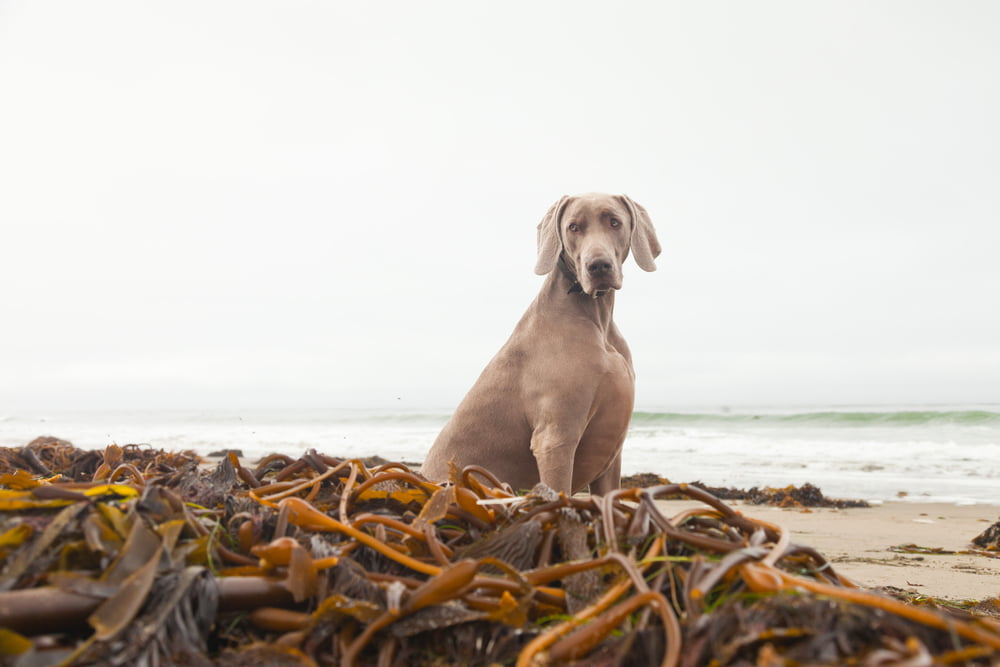
After a stressful work week, you may look forward to unwinding at the beach. Picture yourself working on your tan, while your dog gambols along the seashore. But wait! Your dog suddenly stops, for he has spotted a pile of wild dried kelp.
What is kelp?
Kelp is a brown seaweed that grows in shallow coastal waters. Nowadays, there is a global push for responsible seaweed harvesting practices that preserve the ecosystem.
You may have eaten kelp before (after an internal debate over spirulina vs kelp). You may also have seen companies advertising their kelp-based supplements (e.g. kelp powder) on social media.
As you watch your dog observe the dried kelp for signs of life, you may wonder, “Is kelp good for dogs? How much kelp can I give my dog? Can kelp make dogs sick? What are the dangers of kelp? Spirulina vs kelp – which one is better?” Read on for the answers!
Is Kelp good for dogs?

If your dog has been diagnosed with “hypothyroidism” (low thyroid hormone levels), you may try to increase his thyroid hormone levels with kelp.
Yes, kelp is very healthy! Kelp is low in fat and calories. It is packed with protein, which aids muscle development. It is also full of fiber, which promotes healthy digestion.
Kelp is rich in nutrients such as iodine, calcium, and various antioxidants. These nutrients support crucial processes in the body (e.g. strong immunity, healthy bone development, good blood circulation)
Can dogs have kelp iodine?
Kelp has a “rep” for being iodine-rich. Iodine is a crucial building block of thyroid hormones, which are important for proper metabolism in dogs. “Metabolism” refers to the process that converts what we eat and drink into energy.
However, be careful about overdosing your dog with kelp iodine. Excess amounts of iodine (or other nutrients) can cause weight loss, vomiting, or diarrhea. This is why it’s important to feed your dog recipes that meet AAFCO’s standards for a complete & balanced diet.
If your dog has been diagnosed with “hypothyroidism” (low thyroid hormone levels), you may try to increase his thyroid hormone levels with kelp. However, low dietary iodine is not the only reason for hypothyroidism in dogs. As there are other potential causes, feeding kelp may worsen matters. Consult your vet if you have questions about hypothyroid dogs!
Can kelp help with dogs’ teeth?
Your vet may have drilled the importance of teeth cleaning into you. However, you may feel stuck after several failed attempts to clean your dog’s teeth. Don’t despair! Two studies have found that dogs who ate supplements with Ascophyllum nodosum (a type of brown kelp) had less plaque on their teeth than dogs who did not.
Although you may want to try anything that benefits your dog’s teeth, don’t get too excited and buy all the kelp powder in your local pharmacy! Kelp is safe only if prepared properly, served in appropriate amounts, and given to dogs who are not allergic!
What kinds of kelp can I feed my dog?

Dogs who ate supplements with Ascophyllum nodosum (a type of brown kelp) had less plaque on their teeth than dogs who did not.
Kelp-based pet food, supplements, and treats (e.g. kelp powder)
These can be bought from reputable pet brands. There are many brands around, but they vary in quality. Consult your vet on choosing the right brand!
Even if kelp powder is currently on sale at your local pharmacy, avoid supplements that are meant for humans. They may contain additives and nutrients in quantities that are inappropriate for dogs.
Plain, commercially available kelp
Plain, unseasoned, commercially available kelp is generally okay for dogs in small amounts. However, as brands vary in quality, consult your vet before introducing a brand to your dog!
Wild dried kelp
It is tempting to give your dog food that’s straight from the source. However, you should know the dangers of feeding wild dried kelp to dogs! Wild dried kelp is often soaked in ocean pollutants that can poison your dog. Furthermore, sea critters (like jellyfish) can lurk within wild dried kelp, waiting to poison their next victim with their sting!
Wild dried kelp has been soaked in seawater, which is high in salt. Excess seawater intake can cause salt poisoning. Furthermore, wild dried kelp shrinks under the sun. If a dog eats wild dried kelp, the dried kelp absorbs fluid in the dog’s gut. Thus, it can easily double in size. This can cause a life-threatening gut blockage.
If you suspect that your dog has been stung, is suffering from a gut blockage, or has developed salt poisoning, please seek emergency treatment! Symptoms include vomiting, drooling, difficulty breathing, or even seizures. Please consult an emergency vet even if your dog looks fine after eating wild dried seaweed.
Seasoned kelp
Seasoned kelp may tickle your tastebuds. However, many seasonings (e.g. garlic) are toxic to dogs.
How much kelp can I give my dog?
The optimal amount depends on several factors (e.g. weight, current diet). The dosing labels on kelp powder and other kelp-based products are general guidelines, so consult your vet for personalized advice!
Can kelp make dogs sick?

Some dogs are allergic to kelp. Symptoms include rashes, itchy skin, diarrhea, etc.
If kelp is fed inappropriately or in excess, it can make dogs sick and some dogs are allergic to kelp. Symptoms include rashes, itchy skin, diarrhea, etc. If you are sure whether your dog is allergic, consult your vet!
Conclusion
To summarize, kelp is safe for dogs if prepared correctly as studies show that kelp helps dogs. Kelp is low in fat and calories. It is packed with protein, which aids muscle development. It is also full of fiber, which promotes healthy digestion.



